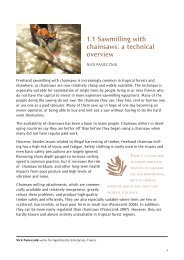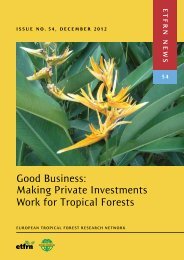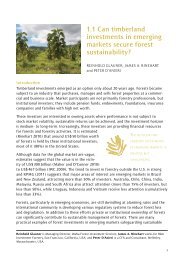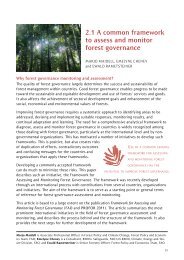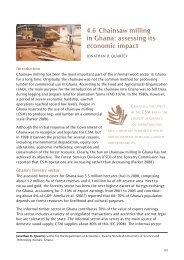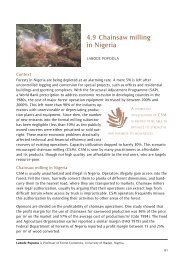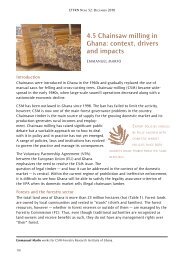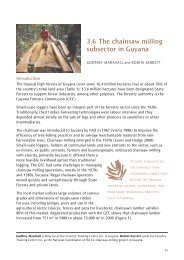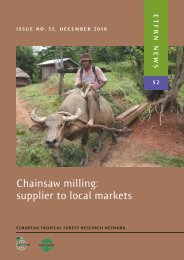Chainsaw milling: supplier to local markets - European Tropical ...
Chainsaw milling: supplier to local markets - European Tropical ...
Chainsaw milling: supplier to local markets - European Tropical ...
You also want an ePaper? Increase the reach of your titles
YUMPU automatically turns print PDFs into web optimized ePapers that Google loves.
32<br />
ETFRN NEws 52: DEcEmbER 2010<br />
The sawn timber is transported <strong>to</strong> the village by boat along the rivers, the only routes<br />
available, and s<strong>to</strong>red along the seashore. later, the timber is transported by a bigger boat<br />
<strong>to</strong> saumlaki, where it is sold.<br />
Development of chainsaw <strong>milling</strong><br />
Compared <strong>to</strong> the other villages of Yamdena, wermatan’s chainsaw <strong>milling</strong> is recent; that<br />
is, less than a generation old. its introduction follows some of the common stages of<br />
<strong>local</strong>ized industrial development: introduction by a pioneer; innovation; and cooperation<br />
among ac<strong>to</strong>rs and diffusion of know-how.<br />
in wermatan, the pioneer (mateus) had worked in the timber industries in irian Jaya. he<br />
demonstrated that buying or borrowing a chainsaw in saumlaki was profitable since the<br />
sawn timber could be used in the village or sold at a good<br />
price. <strong>Chainsaw</strong> teams do not usually produce more than 20<br />
m 3 per year. <strong>Chainsaw</strong> <strong>milling</strong> is perceived by the villagers<br />
as complementary <strong>to</strong> their subsistence work <strong>to</strong> quickly earn<br />
some cash <strong>to</strong> buy goods such as electric genera<strong>to</strong>rs or boat<br />
engines.<br />
The innovation process was also introduced by mateus, who<br />
taught people how <strong>to</strong> use a tinted and tensed wire <strong>to</strong> mark<br />
a straight line on the wood before cutting it with the chainsaw. This method, although<br />
simple, was previously not known <strong>to</strong> the villagers and allowed them <strong>to</strong> produce straightsawn<br />
timber. For more specific uses, the timber must be resawn or planed with industrial<br />
<strong>to</strong>ols such as planers or circular saws, which are available in saumlaki.<br />
skills are progressively transferred. assistants work for a chainsaw opera<strong>to</strong>r for several<br />
months, and when they feel that they know enough, they acquire a chainsaw and become<br />
opera<strong>to</strong>rs themselves. They in turn hire new assistants, and so on.<br />
Financial cooperation exists; opera<strong>to</strong>rs form alliances <strong>to</strong> obtain cash in order <strong>to</strong> acquire<br />
more production <strong>to</strong>ols. For example, a villager wanting <strong>to</strong> buy a chainsaw 3 would establish<br />
a joint harvesting operation with a relative who already owns one. The first person<br />
provides the fuel and the two share the work and the income from timber sales.<br />
in this structure, around 25 <strong>to</strong> 78 m 3 of sawn timber need <strong>to</strong> be produced in order <strong>to</strong><br />
pay for a new chainsaw, depending on the harvested species (Table 1).<br />
The interests of the assistants differ from those of the chainsaw owner for several reasons.<br />
First, as shown in Table 2, the income of the assistants is the same for all species,<br />
while the work is easier with more diverse species. 4 second, cash flow (Table 3) is not<br />
equal for all members of the community according <strong>to</strong> the different species. The higher<br />
income from the more valuable species does not benefit the assistants; they earn more<br />
from species that are less valuable but easier <strong>to</strong> process. This apparent inequity gives<br />
advantages <strong>to</strong> some ac<strong>to</strong>rs in the value chain.



